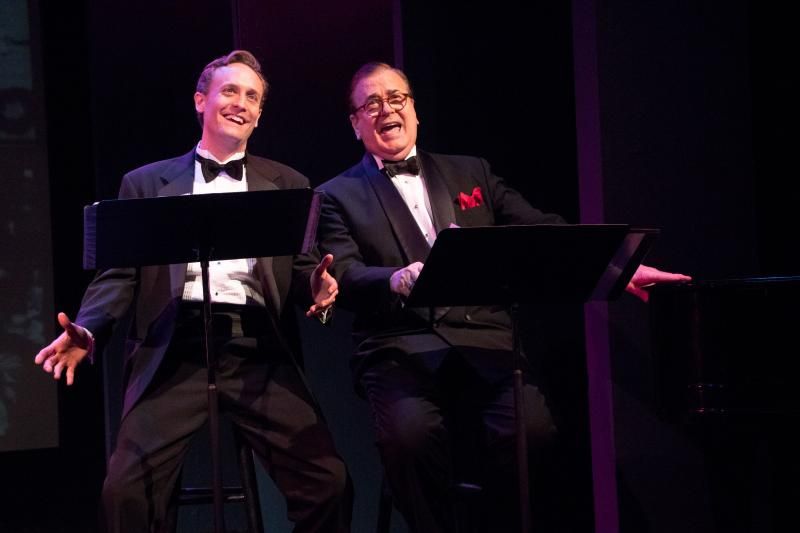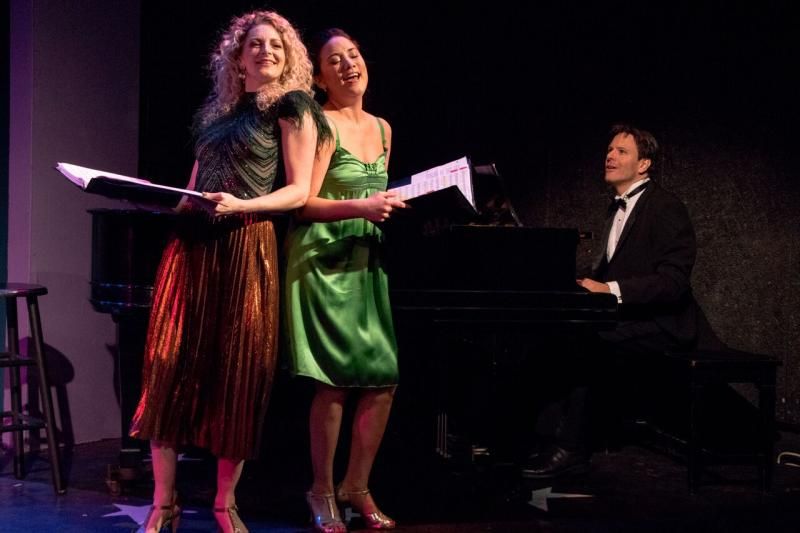Review: The York Revisits Ben Bagley's THE DECLINE AND FALL OF THE ENTIRE WORLD AS SEEN THROUGH THE EYES OF COLE PORTER
Long before Broadway's saturation with jukebox musicals and song catalog shows, Ben Bagley, a producer of modestly-financed Off-Broadway revues, added to what was then musical theatre's long title trend (HOW TO SUCCEED IN BUSINESSWITHOUT REALLY TRYING, A FUNNY THING HAPPENED ON THE WAY TO THE FORUM...) and created a charming revue titled The Decline and Fall of the Entire World as Seen Through the Eyes Of Cole Porter.

(Photo: Ben Strothmann)
Opening in 1965, a bit less than six months after the crown prince of musical comedy cleverness passed on, the five-person show granted star billing to Broadway favorites Kaye Ballard and Harold Lang, attracting clamoring couples to a Greenwich Village venue that would achieve greater notoriety when its name was changed to The Bottom Line.
The eventual cast album became a prominent part of the extensive catalog of theatre albums produced by Bagley, primarily focused on lesser-known selections from Broadway's masters.
Indeed, "Decline and Fall" is far from a greatest hits parade. The set list is packed with selections that even 54 years ago were a bit on the obscure side, often because Porter's lyrics during the 20s, 30s and 40s were frequently loaded with inside jokes about his famous friends.
So instead of the gentle sway of romantic disappointment in "I Get A Kick Out Of You," there's the pounding blues of "I'm Unlucky At Gambling," a woman's lament about a first date that didn't go very well because - hinted at but never stated - her companion is gay. Cole Porter's list song mastery isn't exemplified with "You're The Top" or "Brush Up Your Shakespeare," but with "Farming," a ditty about how celebrities are going homespun. ("The natives think it's utterly utter / When Margie Hart start churning her butter.")
Linking the songs together is a minimal bit of patter, sometimes placing selections in historical context, but more effectively, glibly passing on backstage doings. ("Here's a song Ethel Merman had cut from ANYTHING GOES because she didn't like it. It wasn't even her song in the show.")
Directed by Pamela Hunt, with music direction by onstage pianist, Eric Svejcar, The York's Mufti production of "Decline and Fall" has a terrific company of four giving its own sparkle to this vintage material. The cavalcade is hosted by veteran Broadway favorite Lee Roy Reams, who injects wry humor while getting to the heart of novelty numbers such as the passive-aggressive "Thank You So Much, Mrs. Lowsborough-Goodby" and the bittersweet "I'm a Gigolo," detailing the ups and down of being a society lady's gentleman for hire. He also does a heck of a good Sophie Tucker impersonation and has a rousing time with Danny Gardner when they duet one of the evening's few standard's, "Well, did You Evah?"

(Photo: Ben Strothmann)
Nattily tailored into his classic tux, Gardner appears cut and pasted from 1920s Broadway as he graces the floor, elegantly tap-dancing and soft shoeing through numbers like "Red, Hot and Blue" and ""I Worship You"" and partnering with a music stand, ballroom style, in "I've Got You on My Mind."
His strong vocals and comic chops are showcased with Diane Phelan in the double-entendre specialty "But in the Morning, No!", where a discussion of poker leads to the query, "Can you ante up, my dear?"
Phelan's lovely soprano caresses the sobering ballad "After You, Who?", but also grants power to the anthemic "I Happen To Like New York" and sweet silliness to "When I Was A Little Cuckoo."
Lauren Molina deftly handles comic gems, singing "The Tale Of The Oyster" with kewpie doll energy, embracing the Lower East Side flavor of "Hot House Rose", and hinting at an oncoming breakdown in the one-percenter torch number "Down In The Depths (On The 90th Floor)."
"Decline and Fall" may not offer much of Cole Porter's evergreens, but may be closer to presenting the impishness, elegance and occasional bawdiness that his contemporaries so admired, as his songs provided commentary on the drastically changing world of the early decades of the 20th Century.
Reader Reviews
Powered by
|
Videos

